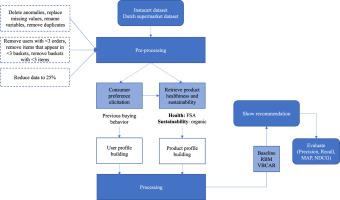用于个性化健康和可持续杂货产品推荐的机器学习算法
International Journal of Information Management Data Insights
Pub Date : 2024-11-20
DOI:10.1016/j.jjimei.2024.100303
引用次数: 0
摘要
如今,零售商试图通过提供个性化服务来优化消费者的购物体验。推荐食品选择,即向消费者提供购买何种产品的建议,就是此类服务之一。用于食品杂货购物的食品推荐系统通常以偏好为基础,利用消费者的购物记录来确定他们喜欢什么产品。这些系统可以很好地预测消费者可能喜欢购买的产品,但却不能刺激消费者购买更健康或更可持续的食品。针对全球日益关注的公共健康和可持续发展问题,本文旨在将食品选择的健康度和可持续发展水平纳入推荐系统,以鼓励消费者购买更好的食品选择。为了评估整合食品选择的健康性和可持续性信息对预测购买项目的影响,我们采用了三种食品推荐模型:基于流行度的基准模型、受限玻尔兹曼机(RBM)和基于(1)偏好、(2)偏好和健康、(3)偏好和可持续性以及(4)所有综合属性的变异贝叶斯情境感知表征(VBCAR)。使用两个不同的数据集对模型进行了训练和测试:Instacart 和荷兰超市数据集。实验结果表明,与 Baseline 和 RBM 相比,VBCAR 的性能有所提高。与基于偏好的模型相比,强调食品选择的健康性和/或可持续性的模型并没有显著改变模型的性能。基于健康和可持续性的推荐系统的结果表明,推荐系统有潜力帮助人们找到更健康、更可持续的产品,同时也符合他们的偏好。本文章由计算机程序翻译,如有差异,请以英文原文为准。

A machine learning algorithm for personalized healthy and sustainable grocery product recommendations
Nowadays, retailers try to optimize the shopping experience for consumers by offering personalized services. Recommending food options, i.e. providing consumers suggestions on what products to buy, is one of such services. Food recommender systems for grocery shopping are typically preference-based, using consumers' shopping history to determine what products they would like. These systems can predict well what a consumer would potentially like to buy, however, they do not stimulate consumers to buy healthier or more sustainable food options. In response to increasing global concerns about public health and sustainability, this paper aims to integrate healthiness and sustainability levels of food options in recommender systems to encourage consumers to buy better food options. To assess the impact of integrating healthiness and sustainability information of food choices in predicting an item to buy, we employ three food recommendation models: a Baseline popularity-based model, Restricted Boltzmann Machine (RBM), and Variational Bayesian Context-Aware Representation (VBCAR) based on (1) preferences, (2) preferences and health, (3) preferences and sustainability, and (4) all combined attributes. Models were trained and tested using two different datasets: Instacart and a Dutch supermarket dataset. The experimental results indicate improved performance for VBCAR compared to Baseline and RBM. Models that emphasize healthiness and/or sustainability of food choices do not significantly alter model performance compared to preference-based models. The results of the health and sustainability-based recommender systems demonstrate the potential of recommender systems to assist people in finding healthier and more sustainable products that are also suited to their preferences.
求助全文
通过发布文献求助,成功后即可免费获取论文全文。
去求助

 求助内容:
求助内容: 应助结果提醒方式:
应助结果提醒方式:


